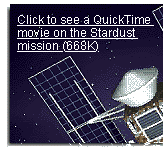|
MISSION
FACTOIDS
  Long
journey: The spacecraft will travel 2 billion miles to meet
Comet Wild-2, and another 1 billion miles to get back home. It
will make three loops around the sun. Long
journey: The spacecraft will travel 2 billion miles to meet
Comet Wild-2, and another 1 billion miles to get back home. It
will make three loops around the sun.
 Minuscule
dust mites: Each comet particle is less than 1 micron (1/25,000
inch) across. Minuscule
dust mites: Each comet particle is less than 1 micron (1/25,000
inch) across.
 Small
sample: Less than one-thousandth of an ounce of comet dust
will be collected, which will be plenty for scientists to study. Small
sample: Less than one-thousandth of an ounce of comet dust
will be collected, which will be plenty for scientists to study.
 High
speed: During its seven years in space, the Stardust spacecraft
races along at an average speed of 48,000 miles per hour. High
speed: During its seven years in space, the Stardust spacecraft
races along at an average speed of 48,000 miles per hour.
 Big
return: Stardust is the first U.S. mission designed to return
samples from another body since the Apollo missions to the moon. Big
return: Stardust is the first U.S. mission designed to return
samples from another body since the Apollo missions to the moon.
 Low
cost, high payoff: The $128 million Stardust probe is one
of NASA's new "Faster, Better, Cheaper" Discovery missions, which
aim to launch small, less expensive spacecraft that have specific
scientific goals, can be built in 36 months or less and cost less
than $150 million dollars. Low
cost, high payoff: The $128 million Stardust probe is one
of NASA's new "Faster, Better, Cheaper" Discovery missions, which
aim to launch small, less expensive spacecraft that have specific
scientific goals, can be built in 36 months or less and cost less
than $150 million dollars.
|
|



